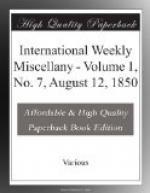How differently would she have “watched and waited” had she been tainted by vanity, or fixed her soul on the mere triumphs of “literary reputation”. While firm to her own creed, she fully enjoyed the success of those who scramble up—where she bore the standard to the heights of Parnassus; she was never more happy than when introducing some literary “Tyro” to those who could aid or advise a future career. We can speak from experience of the warm interest she took in the Hospital for the cure of Consumption, and the Governesses’ Benevolent Institution; during the progress of the latter, her health was painfully feeble, yet she used her personal influence for its success, and worked with her own hands for its bazaars. She was ever aiding those who could not aid themselves; and all her thoughts, words, and deeds, were evidence of her clear, powerful mind and kindly loving heart; her appearance in the London coteries was always hailed with interest and pleasure; to the young she was especially affectionate; but it was in the quiet mornings, or in the long twilight evenings of summer, when visiting her cherished friends at Shirley Park, in Kensington Square, or wherever she might be located for the time—it was then that her former spirit revived, and she poured forth anecdote and illustration, and the store of many years’ observation, filtered by experience and purified by that delightful faith to which she held,—that “all things work together for good to them that love the Lord”. She held this in practice, even more than in theory; you saw her chastened yet hopeful spirit beaming forth from her gentle eyes, and her sweet smile can never be forgotten. The last time we saw her, was about two years ago—in Bristol—at her brother’s, Dr. Porter’s, house in Portland Square: then she could hardly stand without assistance, yet she never complained of her own suffering or feebleness, all her anxiety was about the brother—then dangerously ill, and now the last of “his race.” Major Porter, it will be remembered, left five children, and these have left only one descendant—the daughter of Sir Robert Ker Porter and the Russian Princess whom he married, a young Russian lady, whose present name we do not even know.
We did not think at our last leave-taking that Miss Porter’s fragile frame could have so long withstood the Power that takes away all we hold most dear; but her spirit was at length summoned, after a few days’ total insensibility, on the 24th of May.
We were haunted by the idea that the pretty cottage at Esher, where we spent those happy hours, had been treated even as “Mrs. Porter’s Arcadia” at Thames Ditton—now altogether removed; and it was with a melancholy pleasure we found it the other morning in nothing changed; and it was almost impossible to believe that so many years had passed since our last visit. While Mr. Fairholt was sketching the cottage, we knocked at the door, and were kindly permitted by two gentle sisters, who now inhabit it, to enter the little drawing-room and walk round the garden: except that the drawing-room has been re-papered and painted, and that there were no drawings and no flowers the room was not in the least altered; yet to us it seemed like a sepulcher, and we rejoiced to breathe the sweet air of the little garden, and listen to a nightingale, whose melancholy cadence harmonized with our feelings.




